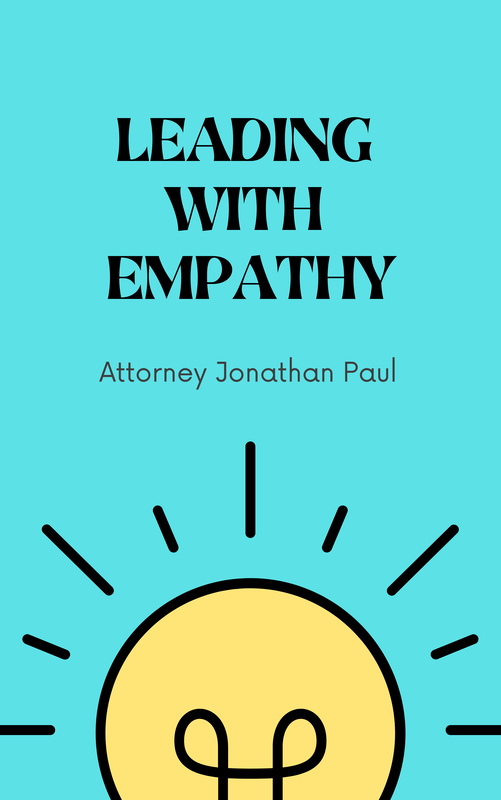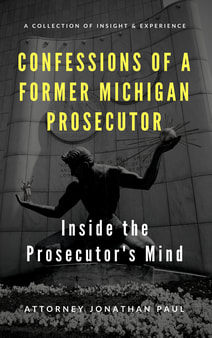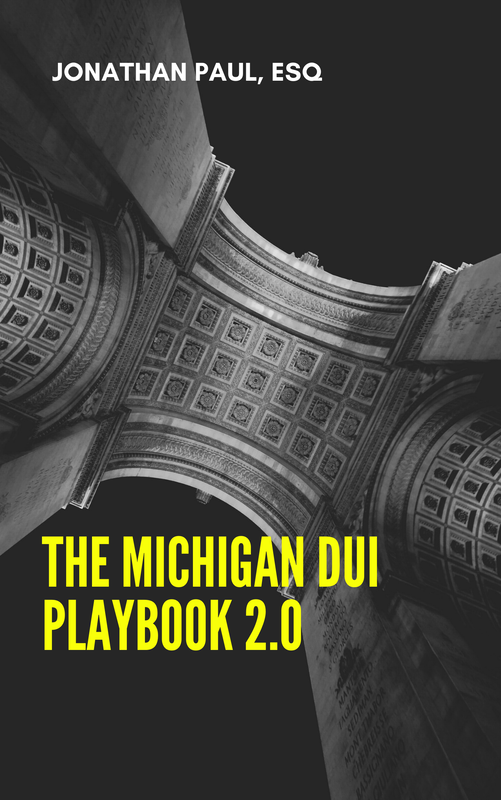Michigan Circuit Court Hardship Appeal - How to work with the prosecutor to get the green light5/21/2018
As a former prosecutor I worked on 1000's of drunk driving cases, and one of the main concerns of the person charges was their ability to drive. A person doesn't realize how important the ability to drive actually is until they are no longer able to do so. It means you can't drive to work, school, drive your kids or family around, go grocery shopping, leave the house to eat or entertainment. Losing your license can be a huge burden on a spouse or friends and family, and I have seen relationships ruined because someone can't drive their car.
One role that a prosecutor has in Michigan is on a circuit court hardship appeal. If someone violates the implied consent law for refusing a chemical test and that ruling is upheld on appeal, a petitioner (the defendant) has the option to file a hardship appeal with the circuit court on the basis of hardship if this is there first implied consent issue. Some counties will have a representative from the Attorney General's Office as a representative for the Michigan Secretary of State, while others will actually have the county prosecutor act as the representative. The court is ultimately looking for a real hardship tied into your ability to work, go to school, perform obligations of your probation and other listed issues. They also want to be sure that public transportation or reasonable alternative accommodations are not available to the petitioner. If you lived down the block from where you work, you could not claim a legitimate hardship to get to and from work as a basis of receiving the license. Many people walk into court and simply say "here is where I work, and here is where I live, I need to drive". That is lazy and not the most effective way to convince both a judge and prosecutor to OVERTURN a license suspension. Think about what that means - you violated the law (implied consent law), your license was suspended because of it, and now you're asking for that decision to be overturned, and all you're going to do is show where you work and where you live? As a former prosecutor I witnessed too many of these situations go wrong, because people did not over-prepare and take the process as seriously as they should from day one. As a proactive criminal defense attorney, we may be shifting gears from our criminal case to the circuit court, but we can use all of our proactive accomplishments for these stage as well. The most important parts will be the substance abuse evaluation and any subsequent following of that recommendation along with the daily alcohol testing. Neither is required, but the substance abuse evaluation is expected, and daily alcohol testing is usually the cherry on top of receiving the hardship license. I can't tell you how many times I've been out in the hallway with the prosecutor/AG representative with another attorney, and all they have is "well it's his first implied consent, and he works 20 miles from where he lives" - I sometimes wish I was the prosecutor again so I could tell that defense attorney - "well he shouldn't have refused the chemical test, I'm not changing the suspension for you" - that's just lazy lawyering - the client could have done the same thing in court. I have my substance abuse evaluation ready, AA meeting logs, alcohol insight class completion certificate, counseling letters and printout of our daily alcohol testing. We're showing the prosecutor that from day one we were open about learning from the situation, followed the recommendation of the health care professional, and you should grant this hardship, because my client HAS NOT BEEN DRINKING and here is proof of that. Not all petitioners are being alcohol tested or even on probation with a court so there's concerns about handing someone a license who is actively drinking - what better than to show proof that my client is not drinking? I always believe in building consensus with a prosecutor, because I learned if you want to go toe to toe with a prosecutor, they will prevail more than they are defeated, because a judge is naturally more familiar with that person and it's the more conservative thing to do. Handing my client the ability to drive soon after a DUI incident is risky, and I acknowledge that - that is why my clients work their butts off to show they should be granted the opportunity to earn back the trust of the prosecutor, judge and community. If I can get the prosecutor to sign a stipulated order for a hardship license in the hallway and we can walk into the courtroom and BOTH tell the judge we want petitioner to receive a hardship license, what's the judge going to do? Say no? Probably not. Some judges will still have concerns, especially newer judges or judges who are not that familiar with these type of proceedings, but I use the same proactive tools with the judge to get my client over the hump, and get them back on the road. Working out deals with the prosecutor - how creative can you be, and how can you save your license?7/21/2017
As a former Oakland County and New York City prosecutor, I've been on both sides of DUI deals for the past 10 years. Everything from DUI cases barely over the legal limit, to serious felony drunk driving charges, all come down to the choice between resolution and trial; most get resolved, but some go to trial.
One particular creative solution that our law firm has used comes with the implied consent issue, and using that as a negotiating tool when most defense lawyers, and prosecutors wouldn't even think to discuss it. When a client has a one-year suspension and six points hanging over their head regardless of the outcome of their criminal case, the floor is certainly lower on the ultimate result. I've beaten drunk driving cases in the criminal courtroom, but my client still lost their license, because they refused the chemical test. We ultimately went the circuit court hardship appeal route, and got the license back, but there's a way to avoid that. Prosecutors and cops work together on cases, and have an open line of communication; this applies especially when working with a city or township prosecutor, and not the county. It may be possible to make the implied consent part of the deal you work out. Although the prosecutor has no say over the hearing, they can certainly tell their officer not to show, and allow you to win by default as part of the deal, or the defendant can withdraw their appeal and lose the the implied consent issue on purpose as part of a deal. Our firm has found that pulling back the implied consent appeal and working out a better DUI criminal case deal, but then streamlining the hardship appeal process at the circuit court is a very good option, and something that other attorneys wouldn't even think to do. If you're dealing with both an implied consent issue and a criminal charge, let's discuss options to keep your license, and dismiss and or reduce some of your criminal charges. Tricking a cop into losing an implied consent hearing in Michigan - Saving Your Driver's License7/15/2017
In Michigan, if you refuse a chemical test, the officer will submit an implied consent refusal to the Michigan SOS, which will take away your license for a full 365 days if you do not appeal it. If you appeal it within 14 days, you get a hearing at your local SOS office where the cop comes in and testifies to the hearing officer on the four points.
(a) Whether the peace officer had reasonable grounds to believe that the person had committed a crime described in [MCL 257.625c(1)]. (b) Whether the person was placed under arrest for a crime described in [MCL 257.625c(1)]. (c) If the person refused to submit to the test upon the request of the officer, whether the refusal was reasonable. (d) Whether the person was advised of the rights under [MCL 257.625a(6)]. I recently held a hearing where the facts allowed me to corner the officer into admitting that my client was placed under arrest for resisting arrest before he even did the field sobriety or PBT testing to make an arrest for drunk driving. I did a limited cross-examination focused on this one issue, and got EXACTLY what I wanted from the cop; he said - yes, I arrested him for resisting arrest. This was perfect, because it was directly against point (B) as it is NOT a drunk driving offense listed by law, and the implied consent would not apply to resisting arrest. Despite my plan working, the hearing officer heard the same thing, and said WHAT, officer so and so, didn't you then also arrest him for drunk driving later on. The cop was able to fix his mistake and he met his burden - the hearing officer was allowed to do this, but I wish he didn't because it should be up to the police officer to do his job. My client will now appeal for hardship with the circuit court and we will hopefully get him back on the road again. What are my options if I lose a Michigan implied consent hearing?If you've lost your Michigan implied consent hearing, you may be able to appeal this decision. A defendant can appeal the decision of the implied consent hearing on written motion of the party for reconsideration under three circumstances.
1) If the party can show there is newly discovered material evidence that could not, with reasonable diligence, have been discovered before the hearing and produced at that time 2) An error of law occurred at the hearing 3) A material mistake of fact was made by the hearing officer. A motion for reconsideration or rehearing shall be filled with the division office in Lansing and served on the opposing party if any within 21 days after the date of the hearing officer's decision. Not having a license can be a real hardship on your ability to work, and take care of your family. I understand this, and want to answer your questions. Winning Michigan Implied Consent HearingIf you have been arrested for a DUI in Michigan, and refused a chemical test, you no longer have your driver's license. This article is about winning the Implied Consent Hearing in order to get your license back. The first issue is whether there was a reasonable grounds for your arrest. The police officer must have a reasonable belief that you have committed a Michigan drunk driving offense. An officer will usually point to a combination of factors that lead to his reasonable grounds for the arrest. The standard is preponderance of the evidence rather than beyond a reasonable doubt, because this is a civil matter. If the officer can only point to one factor, which lead to his or her reasonable grounds, your attorney will argue this is not enough, and you may win the hearing. The second issue the police officer must show that you were placed under arrest for a Michigan drunk driving offense. There must be a valid arrest in order to meet this second standard. One example of an invalid arrest is based upon jurisdiction; if the police officer never observed you driving in the officer's jurisdiction then makes an arrest outside the jurisdiction, this is an invalid arrest. If you are not initially arrested for a Michigan drunk driving offense, and refuse a chemical test, this refusal would not qualify under Michigan's Implied Consent Act. The third issue is whether you refused to submit to the chemical test at the request of the officer. If you are found to have reasonably refused, it does not count as a refusal under the Implied Consent Act. Many defendants have challenged this issue, stating that they requested independent tests instead of the one offered by the police. The current law states that the defendant has a right to an independent test only after they have taken the officer's choice of test. If a defendant requests an attorney before taking any test, the police will usually allow the defendant an opportunity to make a phone call to an attorney regarding the breath test. Courts have ruled if the police do not grant this opportunity, and the defendant refuses, it is deemed a reasonable refusal. A point of confusion is whether the defendant has a time limit to decide to take the breath test. The general guideline states that if the defendant takes more than an hour to decide to take the test, it is deemed a refusal. The examiner at the Implied Consent Hearing will evaluate the exact circumstances behind the refusal and decide whether your refusal was reasonable. The last issue in the implied consent hearing is the police must prove that the defendant was advised of his or her chemical test rights. The officer is required to read these rights in their entirety. There are cases where the officer does not read the rights, but it's the officer's word against the defendant. Police videos can be very helpful in determining whether the police complied with all four requirements. |
Click to Email Me Categories
All
|
Ann Arbor Office LocationPlymouth Office Location |
Representing DUI Clients in MichiganRepresenting clients charged with a DUI in Ann Arbor, Canton, Brighton, Howell, Saline, Adrian, Taylor, Plymouth, Northville, Westland, Ypsilanti, Pittsfield Towsnhip, Warren, Sterling Heights, Farmington, Pontiac, Romulus, Lansing, Novi, South Lyon, Southfield, Birmingham, Bloomfield Hills, Royal Oak, Troy, Rochester, Jackson, East Lansing, Garden City, Livonia, Dearborn, Detroit, St Clair Shores, Hazel Park, Ferndale, Madison Heights, Waterford, Milford, Shelby Township Clarkston, Oak Park, Berkley, Fraser, Sterling Heights, Clinton Township and others throughout Washtenaw, Wayne, Monroe, Jackson, Genesee, Macomb, Ingham, Lenawee, Livingston and Oakland County.
|







